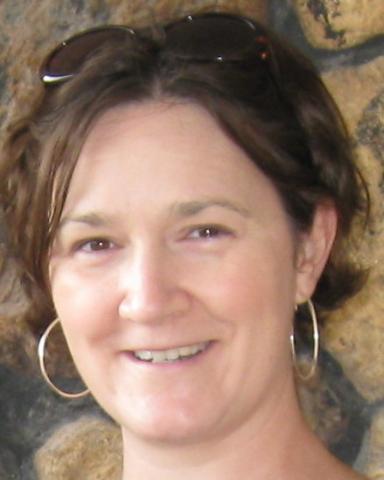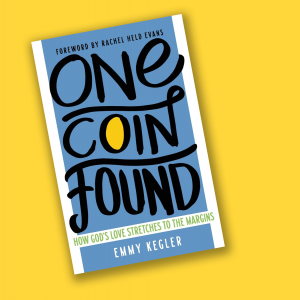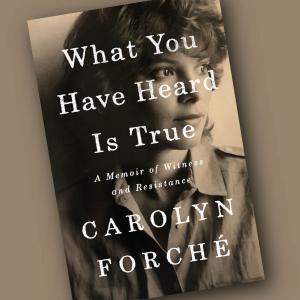
Wendy Besel Hahn is a writer living in Reston, Va. She is currently working on a book about growing up non-Mormon in Utah.
Posts By This Author
Emmy Kegler: ‘Dare to Be Found'
A review of ‘One Coin Found: How God’s Love Stretches to the Margins,’ by Emmy Kegler.
THIS IS NOT merely a survivor’s memoir; it is a grab-your-Bible-and-learn book; it is a love letter to God and the author’s queer family. In her prologue, “Lost,” Emmy Kegler sets out her agenda: “I want to tell you about the lost chapter of the Bible, the one with the story of a shepherd who leaves 99 sheep behind and goes out looking for the one that is lost. The one with the story of a woman who sweeps her entire house looking for the one coin that is lost. The one with the lost son who wanders from home and a lost son who stays and stews in his resentment and a lost father struggling to unite his broken family.”
In her first of many footnotes, Kegler identifies Luke 15:1-32 as that “lost” chapter. She spends the rest of her book conveying God’s expansive love for all who are deemed lost.
Kegler focuses on details of her story, about how bewildering it was to discover she was gay during the AIDS pandemic, in the year after Matthew Shepard’s murder. She observes, “Perhaps this is why I was fascinated by Jesus’ death: I saw the experience of my own people reflected in it.” In another chapter, Kegler recounts the pain of attending a church youth group for two years, with the leadership ultimately asking her to “pray the sinner’s prayer” when she revealed her sexual orientation.
The Demands of Her Witness
A review of ‘What You Have Heard is True: A Memoir of Witness and Resistance,’ by Carolyn Forché.
CAROLYN FORCHÉ’S story begins more than 40 years ago, when the then-27-year-old poet opens her apartment door in California to a stranger from El Salvador. Leonel Gómez Vides—“Leonel,” as she refers to him throughout her book—spends several days outlining the situation in his country and making his case for Forché to come witness the roots of a revolution.
That Forché accepts such a calling, from January 1978 through March 1980 and for more than 40 years beyond, attests not only to her grit but also to her belief in the sanctity of the human spirit and the power of truth.
An awakening usually connotes a positive state of consciousness, yet Forché’s experience calls her to a grim, nightmarish landscape. Once her plane touches down in Ilopango, El Salvador, she ventures into a world in which nearly one in 10 children dies before the age of 5 and 80 percent of the population has no running water, electricity, or sanitation. To read Forché’s rich prose is to travel alongside her through the jungle, where she learns to squat over open pits to relieve herself, and follow her into palatial, private quarters, where she washes away the filth of the road before meeting with the military and civic leaders who want her dead. Beyond the poverty, the country devolves into a hell wherein mutilated bodies appear in the streets and political prisoners are kept in small cages, like animals.
White Parents in an Age of Trump
Raising White Kids: Bringing Up Children in a Racially Unjust America, by Jennifer Harvey. Abingdon Press.
ON THE MORNING of Nov. 9, 2016, I delivered a clumsy lecture to my then 8-year-old son about his responsibility as a white boy in Trump’s America: “If you see something, say something. If anyone tells another child she’s going to be deported, you must speak up. Tell your teacher.”
Jennifer Harvey created a guide for parents like me, who want to teach our kids to be anti-racist but aren’t always sure how: Raising White Kids: Bringing Up Children in a Racially Unjust America . Ordained in the American Baptist Churches (U.S.A), Harvey is a professor at Drake University whose work focuses on racial justice and white anti-racism. She is also a contributor to The New York Times and Huffington Post and the author of Dear White Christians: For Those Still Longing for Racial Reconciliation.
Raising White Kids promotes moving away from a model of color-blindness, which shuts down any discussion of race, toward race-conscious parenting. Harvey draws on many experts. Psychologist Beverly Daniel Tatum describes systemic racism as “smog,” which affects all people. One study cited in the book found parents of color are 2 to 5 times more likely to discuss race with their children than white parents. Failure to teach white kids about America’s unspoken racial scripts leaves kids unprepared to counter racism.
Bunker or Bridge?
At first my 'resistance library' was a protective wall. But is that really what books are made for?
PRIOR TO THE ELECTION, I read J.D. Vance’s best-selling memoir, Hillbilly Elegy, in an attempt to understand Trump’s appeal to lower-income white Americans. However, this didn’t prepare me for the 81 percent of white evangelical Christians, some of them my extended family members, who cast their ballots for, it seemed to me, religious intolerance, misogynistic policies, environmental neglect, and white privilege. On Nov. 9, 2016, I awoke to find not just a world divided between Democrats and Republicans, but two versions of Christianity at odds with one another. Clearly, I had missed something.
Once initial shock over the election results subsided, I began purchasing books—stockpiling them. Perhaps I could build a wall of literature for protection, one of those enormous noise barriers separating residential neighborhoods from freeways, something to block out the racism and bigotry I assumed were behind the election results. What did theologians have to say about these topics? How had previous generations faced authoritarian threats? I searched progressive Christian reading lists: Howard Thurman’s Jesus and the Disinherited, Drew G.I. Hart’s Trouble I’ve Seen, Dietrich Bonhoeffer’s The Cost of Discipleship ... The list grew. I couldn’t stop. Amassing these titles and stacking them higher made me feel righteous. I began referring to them as my “resistance library.”
Existing titles from my bookshelves joined new acquisitions to form adjoining soundproof panels. Some portray a radically different God from the one with whom I grew up: Marcus J. Borg’s Meeting Jesus Again for the First Time, Walter Brueggemann’s The Prophetic Imagination, and Scott W. Gustafson’s Behind Good and Evil. Rachel Held Evans’s memoir, Faith Unraveled, details how she moved away from fundamentalism. Her faith journey mirrors parts of my own. After further rearranging within my bookcases, I erected another section dedicated to world religions. God Is Not One, Stephen Prothero’s book on eight world religions, sat next to Reza Aslan’s primer on Islam, No god but God, and the biography Mormon Enigma: Emma Hale Smith.



